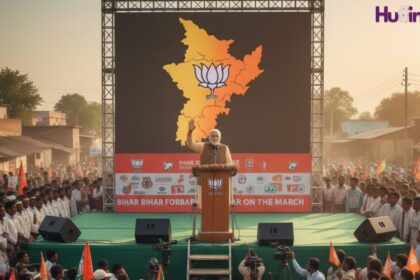India Responds After US Sanctions India-Based Trader Linked to Iran Oil Exports
The India US sanctions issue escalated on Thursday after Washington added an India-based petroleum trader to its expanding sanctions list for allegedly facilitating Iranian oil exports. The move immediately prompted New Delhi to seek full disclosure from the United States, as the development intersects with India’s energy security interests and its wider diplomatic balancing act between Iran and the U.S.
According to the U.S. Treasury’s Office of Foreign Assets Control (OFAC), the India-based entity was listed among 17 companies and individuals accused of operating a financial and logistical network that helped Iran bypass sanctions on its petroleum sector.
What the US Allegations Say
According to the U.S. Treasury’s Office of Foreign Assets Control (OFAC), the sanctioned entities form part of a “global shadow network” enabling Tehran to generate revenue through oil exports despite American restrictions.
The India-based company is accused of:
- Facilitating transport of petroleum derivatives
- Engaging in financial transactions tied to Iranian suppliers
- Operating through intermediaries in the Middle East and East Asia
- Supporting oil movement disguised through re-flagged or trans-shipped cargo
Washington claims such networks funnel “illicit revenue” to Iran, strengthening its sanctioned energy sector.
India’s Official Position: ‘Awaiting Complete Information’
Following the announcement, the Ministry of External Affairs (MEA) said India has reached out to Washington for comprehensive documentation before commenting on next steps.
A senior MEA spokesperson stated:
“We have sought full details from the United States. After examining the specifics, we will take an appropriate view on the matter.”
The spokesperson reiterated that India takes independent decisions based on national interest but remains committed to lawful, transparent and responsible trade practices.
Why This Matters to India’s Energy Security
India, the world’s third-largest crude oil consumer, has historically imported significant volumes from Iran because of its competitive pricing and favourable credit terms.
However, after U.S. sanctions intensified in 2018, India gradually wound down Iranian imports. Still, certain private intermediaries and traders continued to be under scrutiny for potential involvement in indirect supply chains.
Energy experts say the latest sanctions:
- Could heighten scrutiny on private Indian oil traders
- May complicate India–Iran commercial engagements
- Could have minor effects on niche petrochemical supply routes
- Will likely push India to reaffirm its stance on strategic autonomy
The Geopolitical Layer: India Balancing US & Iran
The development comes at a sensitive time in global geopolitics:
- The U.S. is expanding its sanctions against Iranian energy networks
- Iran and India continue cooperation on the Chabahar Port project
- India is deepening defence, trade and tech ties with the U.S.
- Middle-East instability is affecting global oil markets
This puts New Delhi in a diplomatically delicate position — maintaining cooperation with Iran while ensuring its growing partnership with Washington remains stable.
Impact on India-US Relations?
Analysts believe the sanction is unlikely to derail the broader India–US partnership, which is currently at one of its strongest defence, technology and trade phases.
However, the move signals that Washington expects greater compliance even from friendly partners when it comes to Iran-related activity.
Former diplomats note that the episode could open up discussions on:
- Transparency in India’s private oil trade
- Enhancing regulatory monitoring
- Joint frameworks for supply-chain security
- India’s energy diversification plans
Industry Experts React
Energy economist Dr Ritu Anand says the move is more symbolic than punitive:
“The sanction targets a private trading channel, not the Indian government. It is a warning to global intermediaries rather than an attack on India’s energy policy.”
Oil sector analysts predict minimal disruption to India’s mainstream crude import system, which is currently focused on the Middle East, Russia and the U.S.
Stay tuned for more updates huffindia.com


























